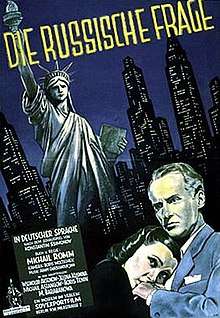The Russian Question
The Russian Question (Russian: Русский вопрос, Russkiy vopros) is a Soviet political drama by renowned filmmaker Mikhail Romm.[1] The film is an adaptation of a play of the same name by Soviet poet and journalist Konstantin Simonov.[2][3]
| The Russian Question | |
|---|---|
 | |
| Directed by | Mikhail Romm |
| Written by | Konstantin Simonov, Mikhail Romm |
| Screenplay by | Mikhail Romm |
| Starring | Vsevolod Aksyonov Yelena Kuzmina Mikhail Astangov |
| Music by | Aram Khachaturyan |
Production company | |
Release date |
|
Running time | 91 minutes |
| Country | Soviet Union |
| Language | Russian |
Subject
New York, 1946: a leading US newspaper company sends Harry Smith, a talented correspondent, to the Soviet Union. His task is to write a scaremongering report about the Soviet belligerent and expansionist intentions in order to further a widespread campaign of propaganda undertaken by the American media and the conservative elite. Harry, a former war correspondent, accepts the attractive deal and sets off to Soviet Russia only to fall in love with a country quite different from the picture shown by the "free press" in its Cold War adversary. Back in the United States, Harry finds himself torn by a dilemma between his consciousness as an honest journalist, and the menacing pressure of his superiors, forcing him to write a convenient untruth.[2][3]
Keeping its ideological design in mind, The Russian Question remains a sophisticated and objective, if somewhat critical portrayal of American Cold War political society. Unlike many other Soviet propaganda films, Romm's drama takes on an American perspective, only showing the Soviet Union discussed in the movie for a short combination of shots. The bulk of the film is centered on American culture, society, politics, history, economy and way of life.[2][3]
Cast
- Vsevolod Aksyonov — Harry Smith
- Yelena Kuzmina — Jessie
- Mikhail Astangov — McFerson
- Mikhail Nazvonov — Gould
- Mariya Barabanova — Meg
- Boris Poslavsky — Hardy
- Boris Tenin — Morphy
- Arkadi Tsinman — Preston
- Mikhail Troyanovsky — Williams
- Gennadi Yudin — Parker
- Viktor Dragunsky — Radio announcer
Awards
References
- David Caute, The Dancer Defects: The Struggle for Cultural Supremacy during the Cold War OUP Oxford, 2003, ISBN 9780191554582, 731 p.
- Peter Rollberg, Historical Dictionary of Russian and Soviet Cinema Scarecrow Press, 2008, ISBN 9780810862685, 580 p.
- Mira Liehm, Antonín J. Liehm, The Most Important Art: : Soviet and Eastern European Film After 1945 University of California Press, 1980, ISBN 9780520041288, 57 p.
External links
- https://www.youtube.com/watch?v=4ePawW0W-do - Full movie on the official Mosfilm YouTube Channel
- The Russian Question on mosfilm.ru
- The Russian Question on IMDb